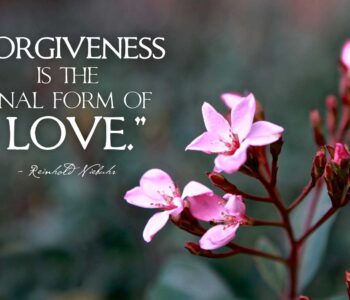 Forgiveness
Forgiveness
After Love Comes Forgiveness – Part 1
Part 1 Contents:
- Measuring your capacity to forgive, The Forgiveness Quiz.
- Offended! What the Bible says about forgiveness.
- What is forgiveness?
- What forgiveness is not.
- Warning signs of unforgiveness.
Part 2 Contents:
- How does unforgiveness affect you?
- True stories of remarkable forgiveness.
- How do I forgive? The Process of Forgiving
Part 1
Measuring Your Capacity to Forgive
How forgiving are you? Take the forgiveness quiz to see where you stand.
How did you do?
A score of 70% or above indicates that you have a relatively high tendency to forgive.
A score of less than 70% suggests that you may have a harder time forgiving.
Offended! What the Bible Says About Forgiveness
You have been offended! You hurt and cannot seem to shake it. It has been months, maybe years and every time you think of it the same old feelings surface. The hurt is folded in the crevices of your mind resurfacing intermittently letting you know it’s still there and it still hurts.
How does God view offences–those done to us as well as those we’ve done to others?
Matthew 5:23-24 (NIV)
23 “Therefore, if you are offering your gift at the altar and there remember that your brother or sister has something against you,
24 leave your gift there in front of the altar. First go and be reconciled to them; then come and offer your gift.
Frankly, this scripture calls Christians to task. It instructs you to leave your praises (gift) to God in your mouth and first be reconciled with your brother or sister who has an offence against you. Additionally, if someone has offended you, address it as quickly as possible. God does not accept your gift of praise and worship until you have done this. God is sticking to the principle that you must love your brother before you can love Him.
1 John 4:20-21 NIV
20 Whoever claims to love God yet hates a brother or sister is a liar. For whoever does not love their brother and sister, whom they have seen, cannot love God, whom they have not seen.
21 And he has given us this command: Anyone who loves God must also love their brother and sister.
It sounds a bit harsh especially to someone that is hurting. But God looks at hurt like mold. If you don’t address mold right away it will grow into something that will gradually make you sick. Essentially, God’s prescription for loving Him is to love Him through loving people. All people, those who have wronged you, including enemies (Matthew 5:43-48). This perfects your gift of praise and worship.
Reflection:
How does this apply to you?
What wounds are you bringing to your worship experience or what wounded bodies are you stepping over to get to the altar of worship?
God Takes Vengeance
Romans 12:17-21 (NIV)
17 Do not repay anyone evil for evil. Be careful to do what is right in the eyes of everyone.
18 If it is possible, as far as it depends on you, live at peace with everyone.
19 Do not take revenge, my dear friends, but leave room for God’s wrath, for it is written: “It is mine to avenge; I will repay,” says the Lord.
20 On the contrary:
“If your enemy is hungry, feed him; if he is thirsty, give him something to drink.
In doing this, you will heap burning coals on his head.”
21 Do not be overcome by evil, but overcome evil with good.
I was taught the ancient idiom “…heap burning coals of on his head” meant that God was going to “get them” if you are nice to them. However, that was incorrect. In ancient times when a fire went out in a person’s home, a neighbor would get burning coals from their house, put them in a bucket and give them to his neighbor so they could have warmth and fire to cook with again. This is an act of kindness not a set up to take them out.
Its use in this verse translates to “make someone feel ashamed of their hostility by surprising them with unconventional kindness.” It was intended to induce feelings of guilt or remorse. Doing the unexpected also reaps reward (Proverbs 25:21-22).
But what about the perpetual offender?
Matthew 18:21-22 (KJV)
21Then came Peter to him, and said, Lord, how oft shall my brother sin against me, and I forgive him? till seven times?
22 Jesus saith unto him, I say not unto thee, Until seven times: but, Until seventy times seven.
Jesus told Peter to forgive 7 times 70 or 490 times. The number 7 is the number of perfection. So, we are to forgive the offender the perfect number of times or any derivative thereof… which is endless. Therefore, you must forgive perfectly continuously. One sure way of ruining a relationship is to keep track of offenses. To pull out a mental list every time you have an argument will destroy any relationship.
Reflection Video:
Jesus Forgave
WE were guilty but God said,
“As far as the east is from the west, so far has he removed our transgressions from us”. ~Psalm 103:12
When you go east as far as you can go, it is west of somewhere. When you go west as far as you can go it is east of somewhere. West and east never meet. Neither will our sins ever be chargeable to our account because HE forgave us!
What is Forgiveness?
Forgiveness is not just receiving a sincere apology; it is taking it one step further and showing empathy and understanding toward the person who offended. It is a decision to understand “why” he or she committed the offence and to intentionally let go of resentment and anger.
What Forgiveness is Not
“Forgiveness is not an occasional act, it is a constant attitude.” ~ Dr. Martin Luther King Jr.
- Forgiveness is not a feeling.
Forgiveness functions like faith. Faith requires you to believe it before you see it. Forgiveness requires you to extend it before you feel it.

- Forgiveness does not mean forgetting.
Forgiveness does not give the person a free pass to continue offending nor does it mean you condone the action. Forgiveness is more for your physiological, mental and emotional welfare than the person you are forgiving.
Reflection Video:
Forgiveness is a gift you give yourself (TDJakes).
- Forgiveness does not necessarily mean reconciliation.
Forgiving a person does not necessarily warrant restoring the relationship as it once was. That is something you have to evaluate. You may decide to move in a different direction and that’s okay.
Another instance of forgiveness without reconciliation is when the person refuses to communicate or the person’s whereabouts is unknown or the person has passed. Still forgiveness is possible. If the person is not available to reconcile then your reconciliation is transacted between you and God.
- Forgiveness is not consciously or unconsciously making the offender do penance.
The offender should not have to “pay” or have any punitive repercussions as a condition of forgiveness. Once words of forgiveness are exchanged then it’s over. Otherwise, you leave the person in a constant state of debt that forgiveness should have cancelled.
- Forgiveness does not mean trust.
Forgiveness is to be offered unconditionally, regardless of the person’s response. This. means we forgive, with or without an apology or evidence of change. However, restored trust in the person is not unconditional. Trust is based on tangible evidence of a change in behavior. Trust can only be repaired after forgiveness has taken place. In other words – it is extremely hard to trust someone you have not forgiven.
- Forgiveness is not instantaneous.
Forgiveness is a process. It may take a while depending on the offence and the person. Sometimes the process requires you digging back into the way you respond to certain situations and why you respond that way. To be thorough, it may require you to examine past traumas that result in you being offended by certain triggers.
Warning Signs of Unforgiveness
Have you gone through the process of forgiving but something is still nagging you? Here are some warning signs that you are still struggling with unforgiveness. Each warning sign is followed by a way to address that issue.
- You feel anger and become petty and reactive
When interacting with the person you make snide remarks. You tend to disagree with them regardless of what is said, i.e., you become passive aggressive. Rather than give them a compliment you prefer to remain silent.
What to do: Pause before engaging with the person. Don’t respond impulsively. Allow yourself time to switch gears to let your response be reflective of objectivity instead of hostility. Otherwise, stay silent so as not to perpetuate the underlying issue in an environment that can offer no resolution.
- You are desperate to make them understand how you feel
You are convinced that if they understood how you felt they would be sorry for what they did. How they’ve responded so far isn’t good enough.
What to do: Hard as it may be, the person is not privy to your sensitivities and may never recognize what they’ve done to the degree you want them to. Accepting them for who they are and what they have to give is the first step in letting it go and moving on.
- You exhibit compulsive behavior
Interaction with the person leads to compulsive activity. Maybe for you this means incessant eating, binge-watching television, or shopping. You may use poor judgement and abuse substances. Anything to make you feel better.
What to do: During compulsive behavior, there is often a moment when you realize what is happening; that this behavior is not going to make it better. Choose to stop. Ask yourself if what you’re doing is helping you to heal or spreading the hurt to other areas and other people? Choose not to add stuff on top of the stuff you are already dealing with.
- You are unable to reframe your experiences
When you allow the offender to frame your memories, though the incident is long past, they are still in control.
What to do: Acknowledge the situation but extract the lessons from it. Although you may not have realized the lessons then, you can see them now. Find the silver lining. Reframe with that.

- You’re not taking responsibility for your feelings
Are you blaming the person you cannot forgive for your feelings or the way you are? When you choose not to forgive what you’re saying to the offender is:
“You are responsible not just for what you did to me, but how I responded to what you did. I hold you responsible for how I am today and my unhappiness.”
What to do: You may be slow to acknowledge it, but only you are responsible for your reactions and feelings.
Reflection:
“Life is 10% of what happens to you and 90% of how you react to it.” ~ Author Unknown
By accusing the person as the cause of you being the way you are is giving them more power than they have. Choose to own up to what is in the realm of your power and your power alone.
- You’re sick
Over time, withholding forgiveness will have a physiological response. It is making you sick.
Unforgiveness contributes to stress related illnesses such as anxiety, depression, high blood pressure, even cancer.
What to do: Letting go of bitterness has been said to not only improve the above conditions, but also improve your immune system, heart, and overall mental health.
“If you’re holding on to unforgiveness for dear life, consider the sobering idea that holding on might actually be slowly taking your life.”
- You’re keeping a list of offenses
It’s not like you’re keeping an actual physical list of all the times you were offended….right?
Most likely it’s a mental list. Each time the person looks at you the wrong way, or says something offensive, or just ignores you, you catalog the action as part of a long list of offenses you use to justify retaliatory or punitive actions. But this backfires…every time.
What to do: If you’ve written a list or the list is a mental list, write it on paper. If you have kept tokens, mementoes, texts, letters or pictures reminding you of what was done take them all out and place them on the table. If you still have some things to say, write a letter.
Then take all of it, hold a ceremony and destroy them any way you chose. Say good-bye! Delete, burn, tear up, shred, just get rid of them. You don’t need to catalog it like evidence of a crime scene. It will only feed resentment and retard forgiveness.
- You self-hate
This is a bit strong but it’s penance of self-flagellation for committing an offence. You are experiencing guilt, shame, and self-judgment. You are not giving yourself the gift of forgiveness the Father gave you when he forgave you of all your sins, past, present and future.
What to do: Simply acknowledge that you are human and spend some time in the Word of God and examine the lives of David, the adulterer and murderer, Paul, the terrorist and Peter, the cussing 2-faced hypocrite. Despite their mistakes and flaws every one of these men were greatly used of God were compelled to forgive themselves because of the grace of God ( 1 Corinthians 15:9-10).
Reflection Video:
- You replay the scene over and over…and over
If you find yourself lying awake in bed or in any random moment replaying events that happened weeks, months, or years ago, and it stirs up fresh resentment then you have not completely forgiven. It is okay to feel hurt but not bitterness. The hurt will eventually subside; however it may take years. Bitterness on the other hand makes a nest and negatively influences your attitude in current similar situations.
What to do: Don’t let the replay run on and on. Hit the stop button by praying out loud. Pray for that person who hurt you. Pray for their current well-being. Thank God for where you are now. Thank God for the lessons learned.
The replays are like blemishes on your skin. They are there and cannot be erased but they can be covered up. Cover them up with positive declarations You can’t think one thing and speak another at the same time. While your mind is ripping through the past, speak peace out loud. The more you speak out loud the quieter the replay is until your declarations completely overpower it. It will be a battle but it’s worth the results.
Reflection Video:
- You gossip about them
It’s natural to want people to side with you in this matter. So, you tell them about it, your side of it.
You may end up divulging more than you intended to say. Maybe even embellishing some points. Remember,
“Death and life are in the power of the tongue, and those who love it will eat its fruits”. ~ Proverbs 18:21
When you gossip, you are doing further harm to your broken relationship and sabotaging the reconciliation process.
While your gossiping may start off as a satisfying experience, the result will end with pushing the person further away.

What to do: When tempted to say something unkind about your offender, say something you genuinely admire about them. If there is nothing you admire, say nothing.
- You did nothing wrong
Even if your situation is one where there was no wrong on your part, using this as a reason for not asking for forgiveness is not justifiable. Refusing to ask for forgiveness of someone who feels you offended them now becomes the offence. Humility always trumps self-righteousness.
What to do: Use a little empathy and put yourself in their shoes. Even if you still can’t relate, the fact is they were offended. Get down off your high horse and apologize, sincerely.
Improper apology:
“If I have offended you, please forgive me,”
Proper apology:
“I have offended you, please forgive me.”
- You refuse to confide in others
Maybe this issue is such a sensitive matter that you will not confide in others to get the help and prayer you need to forgive. Maybe you are ashamed because you will have to disclose some of your missteps. You prefer to maintain your image and not reveal past or present vulnerabilities.
What to do: Identify two or three people you trust, are wise and truthful. Confide in one of them; you need help working through this.
Summary:
No, never said it was going to be easy. But it is a way out and better to work a problem than wallow in it. The worse that can happen is that your progress is slow but at least it is progress and you’re moving…forward.
Part 2 will finish with,
- How does unforgiveness affect you?
- True stories of remarkable forgiveness.
- How do I forgive? The Process of Forgiving
References:
Jesusplusnothing.com
Idioms.thefreedictionary.com
Bible.com
Biblehub.com
Forgiveness can improve mental and physical health (apa.org)
Forgiveness: Your Health Depends on It | Johns Hopkins Medicine
Forgiveness: Letting go of grudges and bitterness – Mayo Clinic
7 Things Forgiveness Is Not – Christian Counseling (sunshynegray.com)



12 COMMENTS
This was very powerful. Very good tips on forgiving others. I learned years ago forgiveness is necessary for me to continue with a healthy spiritual and physical life. Bitterness only hurts yourself not the other person. Thanks! Love you Joyce Shelton
Thanks for reading and your comment Joyce. Love you too!
Thanks for sharing Marilyn. This has giving me a better understanding on forgiveness along with spiritual growth.
Great! I’m glad you got something out of it!
Wow, superb blog layout! How long have you been blogging for? you make blogging look easy. The overall look of your web site is wonderful, as well as the content!
I’ve been blogging for 4.5 years.
Hi would you mind letting me know which webhost you’re using? I’ve loaded your blog in 3 different internet browsers and I must say this blog loads a lot faster then most. Can you recommend a good web hosting provider at a honest price? Cheers, I appreciate it!
I use BlueHost as my platform.
I went over this site and I believe you have a lot of great information, saved to fav (:.
There is obviously a lot to know about this. I suppose you made some good points in features also.
Hi there! Would you mind if I share your blog with my twitter group? There’s a lot of folks that I think would really appreciate your content. Please let me know. Thanks
Absolutely! Be my guest.